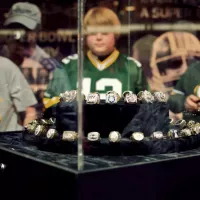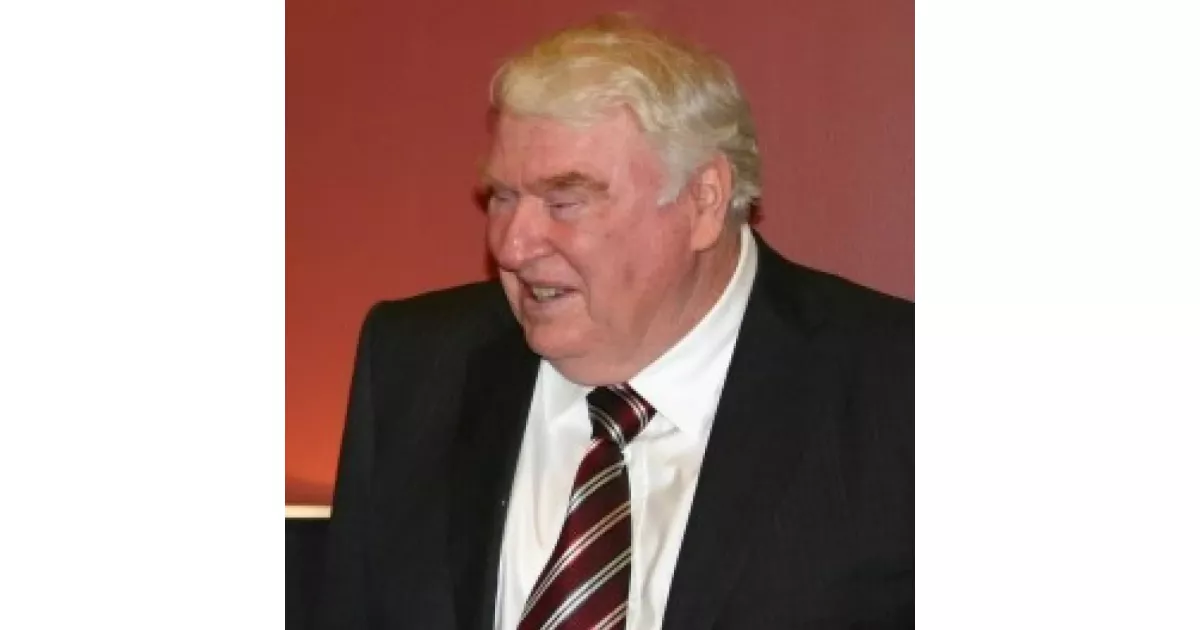John Madden was a highly successful NFL coach and commentator. As head coach of the Oakland Raiders from 1969 to 1978, he achieved remarkable success, including a Super Bowl XI victory. Madden never had a losing season and holds the highest winning percentage among NFL coaches with over 100 games coached, solidifying his reputation as one of the greatest coaches ever. He later became a well-known and respected football commentator.
April 10, 1936: John Madden's Birth
On April 10, 1936, John Earl Madden was born in Austin, Minnesota.
1950: Graduation from Our Lady of Perpetual Help
In 1950, John Madden graduated from Our Lady of Perpetual Help, a Catholic parochial school.
1954: Graduation from Jefferson High School
In 1954, John Madden graduated from Jefferson High School after attending Catholic parochial school.
1954: Plays at the College of San Mateo and Receives Scholarship to Oregon
In 1954, John Madden played one season at the College of San Mateo before receiving a football scholarship to the University of Oregon.
1955: Attendance at the College of San Mateo
In 1955, John Madden attended the College of San Mateo.
1956: Plays Football at Grays Harbor College
In the fall of 1956, John Madden played football at Grays Harbor College.
1957: Selected for Little All-Coast Second Team Honors
During the 1957 season, John Madden was selected by United Press International for Little All-Coast Second Team accolades following his junior season.
1957: Plays for Cal Poly Mustangs
In 1957, John Madden played both offense and defense for the Cal Poly Mustangs.
October 1958: Collarbone Injury Ends Senior Season
In October 1958, John Madden's senior year was cut short due to a season-ending collarbone injury during a game against Long Beach State.
1958: Plays for Cal Poly Mustangs
In 1958, John Madden continued to play both offense and defense for the Cal Poly Mustangs.
January 3, 1959: Plays in All-American Bowl
On January 3, 1959, John Madden played in the All-American Bowl in Tucson, Arizona.
August 1959: Torn Knee Ligament Ends Playing Career
In August 1959, John Madden suffered a torn knee ligament during his first training camp with the Philadelphia Eagles, ending his playing career before playing in a regulation game professionally.
December 26, 1959: Marriage to Virginia Fields
On December 26, 1959, John Madden married Virginia Fields in Santa Maria, California.
1959: Earns Bachelor of Science in Education
In 1959, John Madden earned a Bachelor of Science degree in education from Cal Poly.
October 29, 1960: California Polytechnic State University football team plane crash
On October 29, 1960, the California Polytechnic State University football team plane crash claimed the lives of 16 players, the team's student manager, and a football booster. John Madden lost people close to him in this crash.
1960: Assistant Coach at Allan Hancock College
In 1960, John Madden became an assistant coach at Allan Hancock College in Santa Maria, California.
1960: Plane crash at Cal Poly
In 1960, the university's memorial for the airline crash victims was built at Cal Poly.
1961: Earns Master of Arts in Education
In 1961, John Madden earned a Master of Arts degree in education from Cal Poly.
1962: Promoted to Head Coach at Allan Hancock College
In 1962, John Madden was promoted to head coach at Allan Hancock College.
1963: Allan Hancock Bulldogs Ranked No. 9 Nationally
In 1963, John Madden's Allan Hancock Bulldogs were ranked No. 9 nationally among city colleges.
1966: Defensive Assistant Coach at San Diego State
In 1966, John Madden served as a defensive assistant coach at San Diego State, where the Aztecs were ranked among the top small colleges in the country.
1967: Linebackers Coach for the Oakland Raiders
In 1967, John Madden was hired by Al Davis as the linebackers coach for the AFL's Oakland Raiders, helping the team reach Super Bowl II.
February 4, 1969: Named Head Coach of the Oakland Raiders
On February 4, 1969, John Madden was named the head coach of the Oakland Raiders, becoming the youngest head coach in the AFL/NFL at the age of 32.
1969: First Season as Raiders Head Coach
In 1969, John Madden's first season as head coach of the Raiders resulted in a 12-1-1 record, but they lost the American Football League Championship Game to the Kansas City Chiefs.
1972: Appears in Paul Simon video
In 1972, John Madden appeared in the video for Paul Simon's single "Me and Julio Down by the Schoolyard", in which he attempts to teach football fundamentals to a group of kids playing a pickup game.
1976: Raiders Reach Super Bowl XI
In 1976, the Raiders went 13-1 in the regular season and won the AFC Championship game, reaching Super Bowl XI after a dramatic and controversial victory over the New England Patriots.
January 9, 1977: Wins Super Bowl XI
On January 9, 1977, John Madden won his first and only NFL title with a 32–14 win over the Minnesota Vikings in Super Bowl XI.
1977: Raiders Make Playoffs as Wild Card Team
In 1977, the Raiders made the playoffs as a Wild Card team, but lost the AFC Championship Game.
1978: Tenth Straight Winning Campaign
In 1978, the Raiders enjoyed their tenth straight winning campaign under John Madden, but failed to qualify for the playoffs.
January 4, 1979: Retirement Announcement
On January 4, 1979, John Madden announced his retirement from coaching due to a troublesome ulcer and occupational burnout.
1979: First panic attack on a flight
In 1979, John Madden had his first panic attack on a flight originating in Tampa, Florida, and he never flew on a plane again after this.
1979: Joins CBS as a Color Commentator
In 1979, John Madden joined CBS as a color commentator after retiring from coaching.
1979: Madden Joins NFL Telecasts as Color Commentator
In 1979, after retiring from coaching, John Madden became a color commentator for NFL telecasts.
1981: Becomes Top Football Broadcasting Duo with Pat Summerall
In 1981, John Madden was elevated to CBS's top football broadcasting duo with Pat Summerall, replacing Tom Brookshier.
1982: Hosts Saturday Night Live
In 1982, John Madden hosted an episode of NBC's Saturday Night Live with musical guest Jennifer Holliday.
1984: Madden envisions the game as a teaching tool
During initial planning conversations with Electronic Arts founder Trip Hawkins in 1984, John Madden envisioned the program as a tool for teaching and testing plays.
1984: Creation of the "All-Madden" Team
In 1984, John Madden created the "All-Madden" team, a group of players who Madden thought represented football and played the game the way he thought it should be played. NFL coach John Robinson advised Madden to create it.
1987: Madden Cruiser partnership with Greyhound Lines begins
Beginning in 1987, Greyhound Lines supplied John Madden with a custom bus and drivers in exchange for advertising and speaking events, the partnership was dubbed the Madden Cruiser.
1987: Madden becomes spokesperson for Ace Hardware
In 1987, John Madden became the spokesperson for Ace Hardware store, and would make appearances at several grand openings of local Ace Hardware stores all over the nation.
1988: John Madden Football series is created
In 1988, John Madden lent his name, voice and creative input to the John Madden Football series of video games by Electronic Arts, later called Madden NFL.
January 23, 1994: Final CBS Telecast with Summerall
On January 23, 1994, during their final CBS telecast together, the 1993 NFC Championship Game, John Madden told Pat Summerall that while CBS may no longer have the NFL, at least they have the memories.
1994: 10th Anniversary All-Madden team
In 1994, John Madden created a special 10th Anniversary All-Madden team.
1994: Joins Fox's NFL Coverage
In 1994, John Madden joined Fox's NFL coverage after Fox gained the rights to NFC games. He helped establish Fox's NFL coverage, providing credibility to broadcast what Rupert Murdoch called "the crown jewel of all sports programming in the world."
1997: Began Calling into KCBS Radio
In 1997, John Madden began calling in to radio station KCBS five days a week.
1998: Fox NFL Contract
In 1998, Fox signed an eight-year contract with the NFL, but was reportedly losing an estimated $4.4 billion on its NFL contract.
1999: Appearance on "The Simpsons"
In 1999, John Madden appeared in an episode of The Simpsons titled "Sunday, Cruddy Sunday".
2000: All-Time All-Madden Team
In 2000, John Madden created an All-Time All-Madden team.
September 11, 2001: Provides Transportation After 9/11 Attacks
After the September 11, 2001 attacks, John Madden found an unexpected use for his bus in New York City, when he provided transportation for former ice-skating champion Peggy Fleming, whose flight home to Los Gatos, California, had been grounded.
2001: Madden leaves for ABC and Monday Night Football
In 2001, John Madden left to move to ABC and Monday Night Football, and he ended picking the All-Madden team after this move.
2001: Featured in U2's music video
In 2001, John Madden was featured in U2's music video for the song "Stuck in a Moment You Can't Get Out Of".
2002: Commentator on ABC's Monday Night Football
In 2002, John Madden became a commentator on ABC's Monday Night Football, working with Al Michaels, earning a reported $5 million per year.
2002: Stopped Announcing Thanksgiving Day Games
In 2002, John Madden stopped announcing the Thanksgiving Day games after he moved to ABC, but the tradition of awarding a turkey or turducken to the winning team continued.
2003: Madden's Fox Contract Worth $8 Million
In 2003, John Madden's Fox contract would have been worth $8 million.
2006: Begins with NBC's Sunday Night Football
In 2006, John Madden began providing color commentary for NBC's Sunday night NFL games.
2006: Induction into Pro Football Hall of Fame
In 2006, John Madden was inducted into the Pro Football Hall of Fame, recognizing his contributions to football as a coach and commentator.
November 2, 2008: Returns to NBC Telecast
On November 2, 2008, John Madden returned to the NBC telecast in Indianapolis after taking a week off.
February 1, 2009: Calls Final Game
On February 1, 2009, John Madden called his final game for Super Bowl XLIII between the Arizona Cardinals and the Pittsburgh Steelers.
April 16, 2009: Retires From Broadcasting
On April 16, 2009, John Madden announced his retirement from the broadcasting booth and was succeeded by Cris Collinsworth.
2009: Madden retires as broadcaster
Despite John Madden's retirement as a broadcaster in 2009, he still continued to lend his name and provide creative input to the Madden NFL series.
2009: Madden Ends Commentating Career
In 2009, John Madden ended his career as a color commentator for NFL telecasts. During his time as a commentator, he won 16 Sports Emmy Awards and appeared on all four major American television networks.
2010: End of spokesperson deal with Ace Hardware
In 2010, John Madden's time as a spokesperson for Ace Hardware store ended.
2010: NFL Schedule Change
Until 2010, the NFL did not schedule Sunday night games for one week in October to avoid overlapping with the World Series.
2012: Madden's view on Madden NFL
In 2012, John Madden stated that Madden NFL was "a way for people to learn the game [of football] and participate in the game at a pretty sophisticated level".
2015: Ceased Calling KCBS after Heart Surgery
In Thanksgiving 2015, John Madden ceased calling into radio station KCBS after heart surgery and other health concerns.
June 2016: Bocce tournament raises money for charities
In June 2016, John Madden's bocce tournament, co-hosted with Steve Mariucci, raised $5 million for Special Olympics Northern California, the Juvenile Diabetes Research Foundation, and the Diabetes Youth Foundation.
2017: Begins Twice-Weekly Radio Appearances
In 2017, John Madden began making twice-weekly appearances on KCBS radio again.
August 2018: Stopped Regular Radio Call-ins
In August 2018, John Madden stopped making regular radio call-ins, citing a desire to remove any obligations from his schedule.
2018: Donation of the Madden Cruiser to the Pro Football Hall of Fame
In 2018, John Madden donated the original Madden Cruiser to the Pro Football Hall of Fame, where it was restored to its original condition.
December 25, 2021: Fox premieres "All Madden" documentary
On December 25, 2021, the Fox network presented All Madden, a documentary highlighting Madden's rise to stardom as an NFL coach and broadcaster. The film premiered prior to a Christmas Day contest on Fox between the Cleveland Browns and Green Bay Packers in Green Bay.
December 28, 2021: John Madden's Death
On December 28, 2021, John Madden passed away. He was an American professional football coach and sports commentator in the National Football League (NFL).
2021: Death of John Madden
Up until his death in 2021, John Madden was better known as the face of Madden to contemporary football fans than as a Super Bowl-winning coach and broadcaster.
June 1, 2022: Madden to be featured on Madden NFL 23 cover
On Madden Day, June 1, 2022, EA Sports announced that all editions of Madden NFL 23 would feature Madden on the cover in tribute of his legacy. The next gen version cover being a picture of Madden celebrating his victory as the head coach of the Oakland Raiders in Super Bowl XI, and the All Madden Edition cover being based on the cover of the series' 1st installment, John Madden Football.
October 2022: Madden Donates to Cal Poly Football Facility
In October 2022, Cal Poly and the Madden family announced that John Madden had donated a leading contribution toward a total $30-million football facility on the Cal Poly campus.
2022: John Madden Thanksgiving Celebration
Beginning in 2022, the NFL honored John Madden every Thanksgiving by dubbing the entire tripleheader of games the "John Madden Thanksgiving Celebration". A recording of Madden was played before each of the Thanksgiving games in 2022, and has continued since, along with the awarding of a "Madden Player of the Game" after each game, with NBC continuing on the tradition of awarding the turkey legs to its players of the game.
April 2025: Filming begins for biographical film, "Madden"
In April 2025, filming is scheduled to start for a biographical film, Madden, written and directed by David O. Russell and starring Nicolas Cage as Madden.
2025: Grandson Joins Washington Commanders as Assistant Coach
In 2025, John Madden's grandson, Jesse Madden, was hired as an assistant coach for the Washington Commanders.
2026: John Madden Football Center Anticipated Opening
In 2026, the John Madden Football Center is anticipated to open on the Cal Poly campus.
Mentioned in this timeline
CBS Broadcasting Inc CBS is a prominent American commercial broadcast...
California is a U S state on the Pacific Coast...
Saturday Night Live SNL is a late-night live sketch comedy...

The Super Bowl is the annual championship game of the...
The National Broadcasting Company NBC is a major American commercial...
Arizona is a landlocked state in the Southwestern U S...
Trending

31 minutes ago Yoon Suk Yeol, South Korean ex-president, receives life sentence for insurrection and martial law.

3 hours ago Maya Hawke and Christian Lee Hutson celebrated wedding with Stranger Things cast present.
3 hours ago Wizz Air Launches New Larnaka-Barcelona Flights, Boosting Tourism for Cyprus and Spain.

3 hours ago Jon Ossoff criticizes Trump, speech goes viral, fueling 2028 'Front Runner' speculation.
5 hours ago ANTM's controversies are revealed in a new Netflix documentary, with Tyra Banks facing criticism.
5 hours ago EU monitors Albania's legal changes: Concerns raised over Rama's SPAK amendment.
Popular

Jesse Jackson is an American civil rights activist politician and...
Randall Adam Fine is an American politician a Republican who...

Pam Bondi is an American attorney lobbyist and politician currently...

Barack Obama the th U S President - was the...

Martin Luther King Jr was a pivotal leader in the...

Ken Paxton is an American politician and lawyer serving as...
